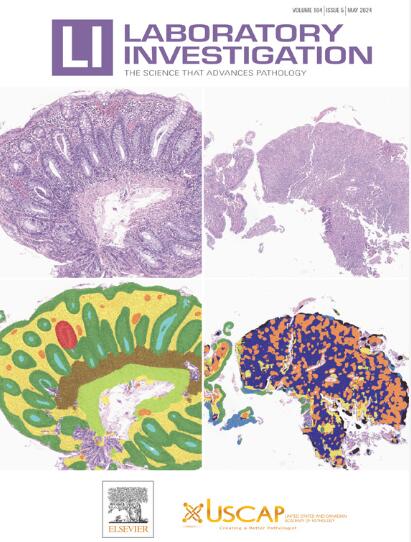肝癌衍生生长因子通过诱导磷酸酶和天丝同源物失活促进肝癌发生。
IF 4.2
2区 医学
Q1 MEDICINE, RESEARCH & EXPERIMENTAL
引用次数: 0
摘要
肝癌源性生长因子(HDGF)位于染色体1q21-23上,该位点在肝细胞癌(HCC)中经常被扩增,并被认为是通过刺激PI3K/Akt信号传导而成为一种致癌因子。磷酸酶和紧张素同源物(PTEN)作为肿瘤抑制因子拮抗PI3K/Akt信号,提示HDGF可能对PTEN有调节作用。本研究旨在探讨HDGF对PTEN的调控作用。采用癌症基因组图谱(TCGA)队列研究探讨肝癌的分子意义和预后。切除临床标本,包括配对肿瘤和邻近非肿瘤组织,分析肝癌队列中HDGF和PTEN的表达。分析HDGF敲除小鼠的肝组织和原代肝细胞的PTEN状态。通过体外和体内基因操作研究HDGF对PTEN的影响。TCGA队列研究显示HDGF与PTEN呈负相关,HDGF过表达成为独立于PTEN水平的主导因素,并与HCC患者预后不良相关。配对临床标本显示,肿瘤组织中HDGF的上调与肝癌患者α-胎蛋白升高、生存期差和复发有关。HDGF敲除小鼠肝脏p-PTEN水平升高,PTEN表达降低。此外,体外研究证实,过表达HDGF可提高p-PTEN水平,促进肿瘤生长,而低表达HDGF则相反。重组HDGF治疗证实了p-PTEN的刺激和PIP3的积累。使用抗HDGF和CK2抑制剂阻断HDGF和CK2信号通路证实了p-PTEN的刺激。我们的研究结果表明,HDGF是一个经常扩增和上调的致癌基因,导致PTEN的表达和活性受到抑制,从而促进肝癌的恶性进展。在切除的配对HCC标本中HDGF的上调可能构成HCC患者有价值的预后生物标志物。本文章由计算机程序翻译,如有差异,请以英文原文为准。
Hepatoma-Derived Growth Factor Promotes Liver Carcinogenesis by Inducing Phosphatase and Tensin Homolog Inactivation
Hepatoma-derived growth factor (HDGF) is located on chromosome 1q21-23, a locus frequently amplified in hepatocellular carcinoma (HCC), and has been proposed as an oncogenic factor by stimulating PI3K/Akt signaling. Phosphatase and tensin homolog (PTEN) acts as a tumor suppressor that antagonizes PI3K/Akt signaling, suggesting a possible regulatory effect of HDGF on PTEN. In this study, we aimed to investigate the regulatory role of HDGF on PTEN. The Cancer Genome Atlas cohort study was used to explore molecular significance and outcomes in liver cancer. Resected clinical specimens, consisting of paired tumor and adjacent nontumor tissue, were analyzed for expression of HDGF and PTEN in the liver cancer cohort. Liver tissue and primary hepatocytes derived from HDGF knockout mice were analyzed for PTEN status. The influence of HDGF on PTEN was investigated through in vitro and in vivo genetic manipulation studies. The Cancer Genome Atlas cohort study revealed an inverse correlation between HDGF and PTEN, with HDGF overexpression emerging as a dominant factor independent of PTEN levels and correlated with poor outcomes in patients with HCC. Paired clinical specimens revealed HDGF upregulation in tumor tissue is relevant to elevated alpha-fetoprotein, and poor survival and recurrent outcomes in the liver cancer cohort. HDGF knockout mice exhibited decreased liver C-tail--phosphorylated PTEN (p-PTEN) levels and increased PTEN expression. Furthermore, an in vitro study validated that overexpression of HDGF increased p-PTEN levels and tumor growth, whereas knockdown of HDGF yielded inverse results. Treatment with recombinant HDGF confirmed the stimulation of p-PTEN and accumulation of phosphatidylinositol 3,4,5-trisphosphate. Blockade of HDGF and casein kinase 2 signaling using anti-HDGF and a casein kinase 2 inhibitor validated the stimulation of p-PTEN. Our results reveal that HDGF is an oncogene frequently amplified and upregulated, leading to suppression of PTEN expression and activity, thereby contributing to malignant progression in liver cancer. HDGF upregulation in resected paired-HCC specimens may constitute a valuable prognostic biomarker for patients with HCC.
求助全文
通过发布文献求助,成功后即可免费获取论文全文。
去求助
来源期刊

Laboratory Investigation
医学-病理学
CiteScore
8.30
自引率
0.00%
发文量
125
审稿时长
2 months
期刊介绍:
Laboratory Investigation is an international journal owned by the United States and Canadian Academy of Pathology. Laboratory Investigation offers prompt publication of high-quality original research in all biomedical disciplines relating to the understanding of human disease and the application of new methods to the diagnosis of disease. Both human and experimental studies are welcome.
 求助内容:
求助内容: 应助结果提醒方式:
应助结果提醒方式:


